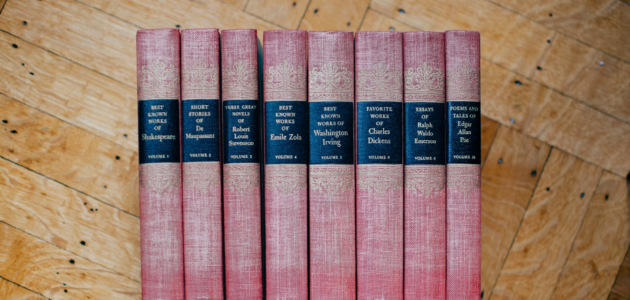
16 Plays It’s Embarrassing You Haven’t Read
Despite the belittling title, this article isn’t meant to make you feel bad. There are a lot of talented and passionate actors out there who are simply not reading or watching plays. There are probably a few reasons for this:
1. They tried to watch a few plays and they were all terrible. So they never went back.
2. They can’t afford it. Totally sympathise!
3. They listened to some horrible readings at school and got put off. (Very common)
4. Netflix is just way too good.
However, if you are not in the habit of regularly reading or watching plays, this has to change. Reading and watching plays is non-negotiable for actors. Even for actors who have no aspirations for the stage. So if I can convince you to give it another shot, here are 16 plays that are worth reading, and might just spark a fire in you!
Updated January, 19th 2021
#1 The Crucible (Arthur Miller)
If you haven’t read or watched this all time classic, get yourself a copy (or, I will give you a free pass to watch Daniel Day Lewis in the 1996 film version). This is a play that, when done right, fires you with passion. An electrifying story of honour, hysteria, truth, bigotry, and deceit.
Side note: The Crucible was the winner of the 1953 Tony Award for Best Play.
Honourable mention: ‘Death of Salesman’, another of Arthur Miller’s classics, could have easily made the list. It seems worlds away, but Miller’s genius is ever-present.

#2 The Importance of Being Earnest (Oscar Wilde)
You would have been living under a seriously big rock to have missed this one. Performed on stages around the world, and taught in most high schools, Oscar Wilde’s The Importance of Being Earnest, is a masterclass in comedy. It’s also hilarious and an easy read. Too much fun to miss.
#3 Hamlet (William Shakespeare)
Shakespeare was always going to make the list. As the most famous playwright of all time, it would be pretty bad form to not have read his most acclaimed play. That said, it took me many years before I read Hamlet. It’s not an easy read, and boy oh boy is it long! However, this play contains many of the most beautiful passages that ever blotted paper. So suck it up, set aside a few hours and get it done. Again, there are a number of good filmed versions, if you cannot stomach trying to read it cold.
#4 Angels in America (Tony Kushner)
A modern classic that all actors should be familiar with. Rife with great scenes and monologues, this play is a modern classic for a reason. One of the most poignant pieces of theatre in the last 100 years. This masterpiece is written in two parts; the first part is definitely a must-read, but it’s worth reading both for the full experience. It is a complex, metaphorical, and a heart-wrenching symbolic examination of AIDS and homosexuality in America in the 1980s.

#5 The Rover (Aphra Behn)
The all-time classic by playwright Aphra Behn. Love, trickery and deception, forced marriage, male power, fidelity, and the excesses of sexual passion, are all themes explored in this vivid and energetic work. Aphra Behn is one of the first women in English history to earn a living through her writing. She was a true trailblazer and her work serves as a poignant reminder of all the work we missed out on as a society by denying women the opportunity to write and have their work recorded in the page of literary history. We are lucky to have this play, and aside from its historical significance, is a really fun and interesting read.
#6 A Doll’s House (Henrik Ibsen)
Ibsen is a name most actors are aware of, but unless you were forced to read his work as a student, you probably haven’t opened up a copy of one of his plays. But I promise you, A Doll’s House, though nearly 150 years old, is still as relevant and hard hitting as ever. Ibsen was a master of story structure, and though at times his work can feel a little stilted, you get lost in his wonderful storytelling.
Honourable mention – Ibsen’s other classic, ‘Hedda Gabler’, is another play worth reading if you find yourself enjoying the Norwegian playwright.
#7 The Glass Menagerie (Tennessee Williams)
This was one of those plays that made a big impression on me when I was just getting into acting, and it still means a great deal to me today. This was Williams’ breakout play and one that will immortalise him in lists like this for centuries to come. Though often described as dream-like, the authenticity of this play’s characters will shake you to your foundation. A great play for any young performer to read.
#8 A Raisin in the Sun (Lorraine Hansberry)
The 1959 Broadway production of A Raisin in the Sun was a watershed moment in theatrical history. At a time when there was perceived to be no Black Broadway audience, no commercial viability for a serious Black play, and no significant “crossover” with white audiences for a play about African Americans, this play achieved the impossible: an all-out commercial and critical success. The 29-year-old playwright subsequently won the Best Play of the Year Award from the New York Drama Critics; Hansberry was the first black author and only the fifth woman to do so.
#9 Waiting for Godot (Samuel Beckett)
This play is as famous as they come, but to sit down and read it is a challenge even for a seasoned play reader. It’s absurd, cyclical nature, makes it hard to get into. That said, it is a classic for a reason. And a play that is referenced and discussed at length. So get into it! For more on Samuel Beckett.
#10 The Homecoming (Harold Pinter)
Pinter is one of the most unique, and well-known playwrights on this list. The Homecoming is perhaps his most famous work, but reading at least one play from his canon is imperative. His work is honest, dark and insightful. He also broke convention and created his own style of writing and theatrical language we can now refer to as “pinteresque”. This style involved using colloquial language, cliches, unpolished grammar and irregular syntax to create dialogue that sounded like everyday speech. This may not seem revolutionary now, but the very fact that most contemporary plays are written in everyday speech can be largely attributed to Pinter’s influence on the world of playwriting. He also made famous the significance of the absence of language on the rhythm of a play with what we now refer to as a “Pinter pause”.
#11 The Seagull (Anton Chekhov)
It was tough deciding which of Chekhov’s plays to add to this list, as Chekhov was such a consistently brilliant writer. Uncle Vanya and Three Sisters are two notable mentions. For me this was a personal choice, and The Seagull is a play that has always intrigued me. A master of story structure, Chekhov’s plays have so much to them. From banal comedy to grand philosophy, Chekhov has it all. Like Shakespeare, the more you read, the more is revealed. His work may not be the most riveting read if you are just getting back into plays, but he is one of the greatest playwrights of all time for a reason. It is important to seek out a good translation which captures the dry humour and translates accurately the Russian idiosyncrasies that fill his plays.
#12 Long Day’s Journey into Night (Eugene O’Neill)
This was one of the first plays I read that really affected me as an actor. A poignant family drama that so beautifully captures a domestic world. I cannot encourage actors to read this play enough! It’s long, but I assure you it’s not easy to put down. An astonishing play.
#13 Top Girls (Caryl Churchill)
Top Girls is arguably Caryl Churchill’s most well known play. It’s an intricate look at power and the abuse of power. She is one of our contemporary masters and if you are not familiar with her work, make yourself familiar. This play is produced all around the world, so keep an eye out in your city. It is very visual, with strong characters, so fantastic to see in the flesh. Caryl Churchill, and this play in particular, is revolutionary in both content and form. Its political commentary about women in power during the Thatcher administration is biting and was controversial when it premiered. In terms of form, Churchill was innovating theatrical language when she included in the play script slashes to mark out exactly when characters would come in with their line, cutting off the characters who are sometimes only halfway through what they’re saying. This is another example of a theatrical playwriting convention that is common practice that we can almost directly accredit to this writer.

#14 Pygmalion (George Bernard Shaw)
Pygmalion both delighted and scandalised its first audiences in 1914. When I first read this play in 2011 I was equally delighted. A wonderfully witty reworking of the classical tale of the sculptor Pygmalion, who falls in love with his perfect female statue. However, it is also a barbed attack on the British class system and a statement of Shaw’s feminist views. This is just one of many Irish Playwrights we love at StageMilk!
Note: this play went on to be made into the well loved musical theatre classic, My Fair Lady.
Read: Best Bernard Shaw Plays
#15 Rosencrantz and Guildenstern are Dead (Tom Stoppard)
A hilarious, existential, tragi-comedy which takes place mainly “in the wings” of Shakespeare’s Hamlet, exploring the lives of two minor characters, the courtiers Rosencrantz and Guildenstern. This is a hilarious read, and even more fun to experience on stage. A witty, sharp and lively read that I encourage reading slowly. Tom Stoppard’s intellect is sometimes hard to keep up with, but you will be smarter for having read this play.
#16 Mother Courage and Her Children (Bertolt Brecht)
So I’m a little embarrassed, as I have never read this play, however, there are few playwrights discussed more in classrooms and workshops than Bertolt Brecht. If you aren’ familiar with his work, get familiar. His plays I think are better watched than read due to their style, but if there’s no Brecht on in your town, get thee to a library!
Why do I need to read plays?
You may have reached the end of this article with a much longer reading list than expected and a question on your mind: Why exactly do I need to read these plays?
A good knowledge of the theatrical canon can be inspiring. Most people grow up surrounded by a lot of film and television, but not as much theatre. And so, your idea of what acting may come rather exclusively from what you see in the world of screen; this can often result in young actors who don’t understand the mechanisms of acting for the stage. This is also why you should see theatre, and brilliant performers in particular, whenever you get the chance. Reading plays, and reading widely, gives you the awareness of the broad spectrum of what may be required of you as an actor in a stage production.
As you may have noticed when reading through this article, many famous plays are famous because they did something new or different with theatrical convention or language. Whether that’s in introducing colloquial language, dictating pauses and cut-offs, or creating unique language styles, great writers are great innovators. As an actor, the more familiar you are with these styles and conventions, the quicker you will be able to identify them in a script or even an audition piece. It also helps you communicate with your co-actors, writers, and your director in the rehearsal room. Though this may feel gate-keepy, you don’t want to be the only actor who has no idea what’s going on when a director references “a Pinter pause”.
Reading plays will also keep you curious, and keep you active, in between productions or auditions. Much like an athlete who has been told to use visualisation when they can’t be physically training, as you read a play you can activate the same parts of your creative mind and soul as you would when in rehearsals. We can’t always be performing, or in rehearsals, but we can stay active in our growth as an actor.
Happy reading everyone, see you on the other side!
I would love to hear your favourite plays. So if you have read anything great recently send me an email, or message us on Facebook or Instagram. I always love getting great play recommendations.

Leave a Reply